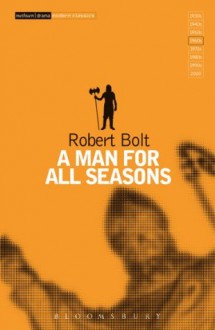 A Man For All Seasons
A Man For All Seasons is a play concerned with morality, politics and the common man. It is a play that though written decades ago, holds great wisdom for the individual of today and in its own particular way utilises a known historical event to address particular issues.
The core argument of this play is whether morality and law or religion and law must be separated. Whether it should or should not be is a separate debate to this review, however Robert Bolt's argument appears to be that a man or woman must stick to their beliefs. That to do otherwise and to compromise lacks moral integrity.
The suggestion through the play is that morals can be seen as just a gesture. And any gesture is of course not important when contrasted against any form of legality. However, the protagonist of the play, Thomas More, takes the stand that morals are above the law, not mere gestures, for they define a man. And a man's self is all he has in the end according to More. To that end morality comes over man made laws because to More morality essentially stems from God.
The history of this play was defined in the preface by the author. Many will know the popular version of the story, of how Henry the VIII decided to first marry his brother's widow Catherine, getting the Pope to change laws based on Biblical ideals, and then to divorce her in favour of one Anne Boleyn. All of which led to the known history of Henry VIII's wives of course. That aside, the means by which he divorced Catherine is what forms the real conflict of the play. For Henry VIII decided that the Pope was nothing but a Bishop of Rome rather than God's representative as was thought at the time. As such this lead to Henry VIII deciding that all bishops (including the Pope) were under the ruler-ship of a King and then he appointed the Archbishop of Canterbury which led to the formation of the Anglican Church - the Church of England. The rest as they say is history.
Thomas More as a character in this play, stands in opposition to these acts by the king. He presents the view that the Magna Carter protects the Church from the throne as well as indicating that God and his representatives are above the throne. Everything boils down, therefore, to More refusing to swear an oath despite his children telling him that surely words mean nothing if not meant in the heart. And yet More, dramatically refuses to swear this oath for to swear a false oath before God would be a grave compromise.
It is fascinating how political this play is, and also that it features an execution with a set conclusion - with a rigged trial considering that so much pageantry surrounds politics and trials. It is also fascinating that the main narrator for the play is called the Common Man and plays a variety of roles, occasionally breaking the fourth wall to speak to the audience. The most interesting aspect of this character is that he does nothing to prevent the disaster that occurs in the play, hinting that Bolt is aiming to show his audience that when the common individual does nothing to prevent it, tragedy will triumph.
A Man For All Seasons is the story of a man who essentially does not bow to others putting pressure on his beliefs in regards to politics, religion and one state Marriage (a marriage that Henry VIII argued semantically, was invalid). Whether we are meant to be that man for all seasons is a question for the reader or observer to consider. The key issue of importance appears to be that one should recognise what they can do to prevent disaster from striking.
Feel free to debate any of these issues in the comments section. As long as all comments are civilised I'm certain they will prompt interesting discussion.


 Log in with Facebook
Log in with Facebook 







